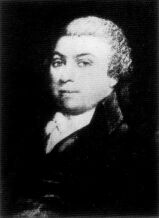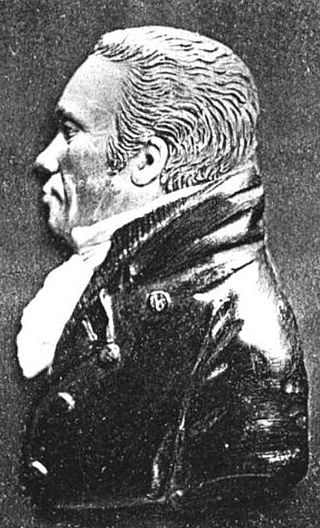Related Research Articles

Presidential elections were first held in the United States from December 15, 1788 to January 7, 1789, under the new Constitution ratified in 1788. George Washington was unanimously elected for the first of his two terms as president and John Adams became the first vice president. This was the only U.S. presidential election that spanned two calendar years without a contingent election and the first national presidential election in American history.

Samuel Dexter was an early American statesman who served both in Congress and in the Presidential Cabinets of John Adams and Thomas Jefferson. A native of Boston, Massachusetts, Dexter was a 1781 graduate of Harvard College. After receiving his degree he studied law, attained admission to the bar in 1784, and began to practice in Lunenburg, Massachusetts.

Samuel Sewall was an American lawyer and congressman. He was born in Boston in the Province of Massachusetts Bay.

The 1788–89 United States House of Representatives elections were the first U.S. House of Representatives elections following the adoption of the Constitution of the United States. Each state set its own date for its congressional elections, ranging from November 24, 1788, to March 5, 1789, before or after the first session of the 1st United States Congress convened on March 4, 1789. They coincided with the election of George Washington as the first president of the United States.

Thomson Joseph Skinner was an American politician from Williamstown, Massachusetts. In addition to service as a militia officer during the American Revolution, he served as a county judge and sheriff, member of both houses of the Massachusetts legislature, U.S. Marshal, and member of the United States House of Representatives. He served for two years as Treasurer and Receiver-General of Massachusetts, and after his death an audit showed his accounts to be deficient for more than the value of his estate, which led to those who had posted bonds on his behalf having to pay the debt.

Benjamin Adams was an American lawyer and politician.

Richard Fletcher was a member of the United States House of Representatives from Massachusetts. The brother of Governor Ryland Fletcher, he was born in Cavendish, Vermont on January 8, 1788. He pursued classical studies and graduated from Dartmouth College in 1806. He taught school in Salisbury, New Hampshire, studied law, was admitted to the bar and commenced practice there.
Events from the year 1788 in the United States.

The 1788–1789 United States Senate elections were the first U.S. Senate elections following the adoption of the Constitution of the United States. They coincided with the election of George Washington as the first president of the United States. As these elections were prior to the ratification of the Seventeenth Amendment in 1913, senators were chosen by state legislatures.
Massachusetts law required a majority vote, necessitating additional votes if no one won a majority. This was necessary in 4 of the districts.
Elections to the Massachusetts Senate were held during 1788 to elect 40 State Senators. Candidates were elected at the county level, with some counties electing multiple Senators.
The 44th Massachusetts General Court, consisting of the Massachusetts Senate and the Massachusetts House of Representatives, met in 1823 and 1824 during the governorship of William Eustis. Nathaniel Silsbee served as president of the Senate and William C. Jarvis served as speaker of the House.
The 27th Massachusetts General Court, consisting of the Massachusetts Senate and the Massachusetts House of Representatives, met in 1806 and 1807 during the governorship of Caleb Strong. John Bacon served as president of the Senate and Perez Morton served as speaker of the House.

The 31st Massachusetts General Court, consisting of the Massachusetts Senate and the Massachusetts House of Representatives, met in 1810 and 1811 during the governorship of Elbridge Gerry. Harrison Gray Otis served as president of the Senate and Perez Morton served as speaker of the House.
The 36th Massachusetts General Court, consisting of the Massachusetts Senate and the Massachusetts House of Representatives, met in 1815 and 1816 during the governorship of Caleb Strong. John Phillips served as president of the Senate and Timothy Bigelow served as speaker of the House.
The 29th Massachusetts General Court, consisting of the Massachusetts Senate and the Massachusetts House of Representatives, met in 1808 and 1809 during the governorship of Levi Lincoln Sr. Harrison Gray Otis served as president of the Senate and Timothy Bigelow served as speaker of the House. In 1808, the state legislature elected James Lloyd as the Class 1 United States Senator from Massachusetts to succeed John Quincy Adams following his resignation on June 8, 1808.
The 23rd Massachusetts General Court, consisting of the Massachusetts Senate and the Massachusetts House of Representatives, met in 1802 and 1803 during the governorship of Caleb Strong. David Cobb served as president of the Senate and John Coffin Jones served as speaker of the House.
The 26th Massachusetts General Court, consisting of the Massachusetts Senate and the Massachusetts House of Representatives, met in 1805 and 1806 during the governorship of Caleb Strong. Harrison Gray Otis served as president of the Senate and Timothy Bigelow served as speaker of the House.
References
- ↑ "Today in History: January 9". loc.gov. Library of Congress.